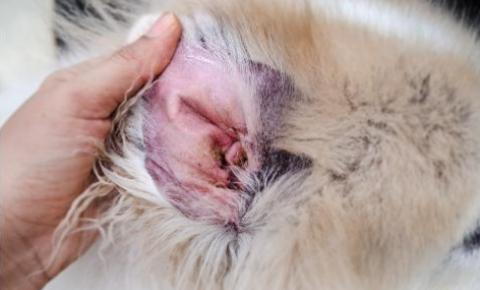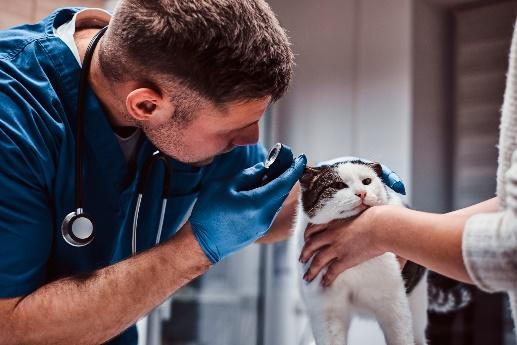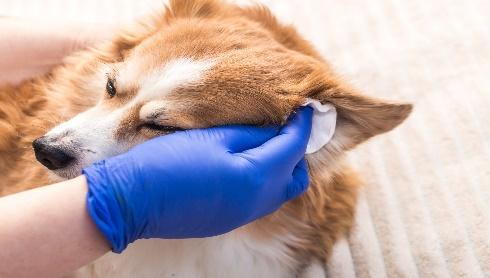
Ear Infections in Pets: Understanding, Treating, and Preventing
- posted: Apr. 25, 2024
Ear Infections in Pets: Understanding, Treating, and Preventing
Ear infections, medically known as otitis externa, occur when the ear canal becomes inflamed and infected. This condition can affect both cats and dogs, although dogs, particularly those with floppy ears or excessive hair in the ear canal, are more prone to them. Cats, especially those with allergies or ear mites, can also develop ear infections.
What causes ear infections in pets? These infections can start from various factors, including:
Bacterial or Yeast Overgrowth: The warm, moist environment of a pet's ear canal creates a perfect breeding ground for bacteria and yeast. When these microorganisms overgrow, they can lead to infections.
Allergies: Just like humans, pets can suffer from allergies too. Allergens such as pollen, dust mites, and certain foods can trigger inflammation in the ears, making them more susceptible to infections.
Foreign objects: Foxtails, or other foreign objects can become lodged in the ear canal, causing irritation and infection.
Ear mites: These tiny parasites can cause irritation and inflammation in the ear canal, leading to secondary infections.
Excessive moisture: Swimming or bathing can introduce moisture into the ear canal, creating a breeding ground for bacteria and yeast.

What are the signs and symptoms of ear infections in pets?
· Excessive scratching or rubbing of the ears.
· Head shaking or tilting.
· Redness or swelling of the ear canal.
· Discharge or foul odor from the ears.
· Sensitivity or pain when touching the ears.
How to treat dog or cat ear Infections? Can you treat a dog ear infection without a vet?
If you suspect your pet has an ear infection, it's essential to seek veterinary care quickly. It's tempting to try home remedies or over the counter treatments to relieve discomfort. However, treating ear infections in dogs without proper veterinary advice can often make the infection worse. Lakewood Pet Vet will conduct a thorough examination of your pet's ears, which may include a microscopic examination of ear discharge to identify the underlying cause of the infection. Treatment typically involves:
Cleaning: Our team may need to clean your pet's ears to remove debris and discharge, allowing medications to penetrate the affected area.
Medication: Depending on the cause of the infection, your vet may prescribe ear drops, antibiotics, antifungal medications, or steroids to relieve inflammation and stop the infection.
Follow-Ups: Follow your vet's instructions for administering medications and schedule any follow-up appointments as recommended to monitor your pet's progress.

How to prevent a dog or cat ear infection?
While some pets may be more prone to ear infections due to underlying factors like ear anatomy or allergies, there are steps you can take to reduce the risk:
Regular Ear Checks: Make it a habit to check your pet's ears regularly for signs of redness, swelling, or discharge.
Keep Ears Clean and Dry: Gently clean your pet's ears with a veterinarian recommended ear cleaner to remove excess wax and debris. Avoid using cotton swabs or inserting anything into the ear canal, as this can cause injury.
Manage Allergies: Work with your vet to identify and manage any underlying allergies that could contribute to ear infections.
Regular Grooming: Keep your pet's ears trimmed and free of excessive hair, especially if they have long or floppy ears that can trap moisture.
Regular Veterinary Exams: Schedule routine wellness exams for your pet to catch any potential health issues early on, including ear infections.
Ear infections can be a source of discomfort for your pet, but with proper understanding, proactive care, and prompt veterinary attention, you can help keep their ears healthy. If you suspect your pet has an ear infection or any other health concerns, don't hesitate to reach out to Lakewood Pet Vet for guidance and support
Hours of Operation
8:00 am - 7:00 pm
8:00 am - 7:00 pm
8:00 am - 7:00 pm
8:00 am - 7:00 pm
8:00 am - 7:00 pm
8:00 am - 4:00 pm
8:00 am - 4:00 pm
Location
Find us on the map
Lakewood Pet Vet
6405 Del Amo Blvd
Lakewood, CA 90713
